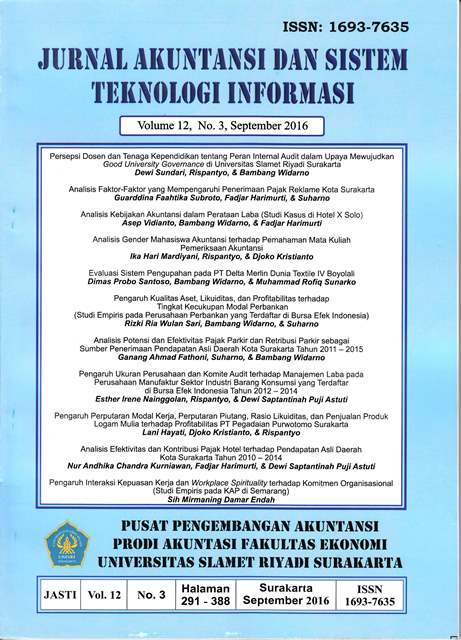PENGARUH KUALITAS ASET, LIKUIDITAS, DAN PROFITABILITAS TERHADAP TINGKAT KECUKUPAN MODAL PERBANKAN (Studi Empiris pada Perusahaan Perbankan yang Terdaftar di Bursa Efek Indonesia)
Abstract
The purpose of this study was to analyze: 1) the impact asset quality on the bank's capital adequacy. 2) the effect of liquidity on the bank’s capital adequacy. 3) the effect of profitability on the bank’s capital adequacy and 4) the effect of asset quality, liquidity and profitability simultaneously on bank’s capital adequacy. This research is an empirical study on the bank listed on the Indonesia Stock Exchange. The type of data using quantitative and qualitative data. The study population was a conventional bank listed on the Indonesia Stock Exchange. Sampling techniques used sensus with a sample of 30 conventional banks. Source data used secondary data from website www.idx.co.id. Methods of data collection used documentation and literature study data were analyzed used classical assumption test and multiple linear regression analysis. The results showed that the quality of the assets has significant negative effect on the bank’s capital adequacy. Liquidity has positive but not significant effect on bank’s capital adequacy. Profitability has positive and significant effect on the bank’s capital adequacy. Asset quality, liquidity and profitability simultaneously significant effect on the bank’s capital adequacy.
Keywords: asset quality, liquidity, profitability and capital adquacy
Downloads
Published
Issue
Section
License
Authors who publish this journal agree to the following terms:
- Authors retain copyright and grant the journal right of first publication with the work simultaneously licensed under a Creative Commons Attribution License that allows others to share the work with an acknowledgement of the work's authorship and initial publication in this journal.
- Authors can separately make additional contractual arrangements for non-exclusive distribution published by the journal (e.g., publish it in a book), with an acknowledgement of its initial publication in this journal.
- Authors are allowed and encouraged to send their work via online (e.g., in the institutional repositories or their website) after published by the journal.










